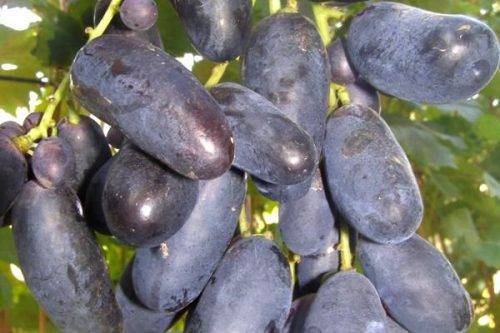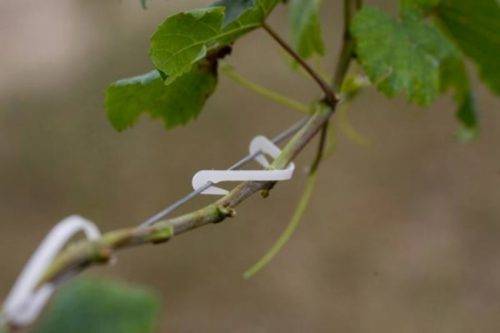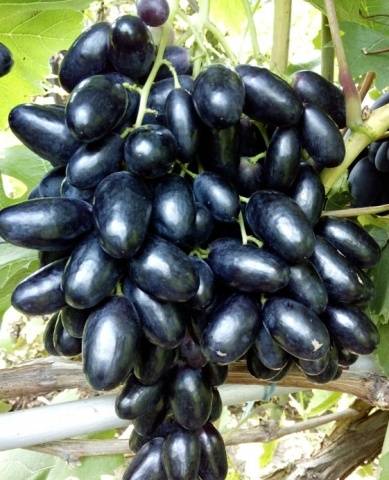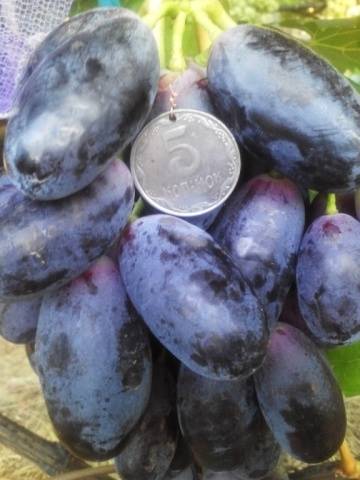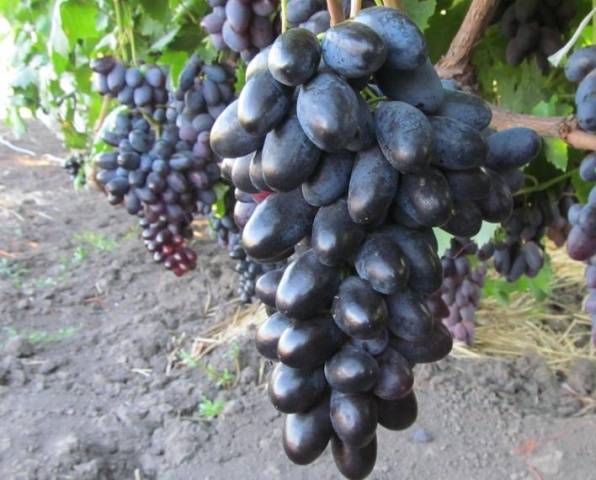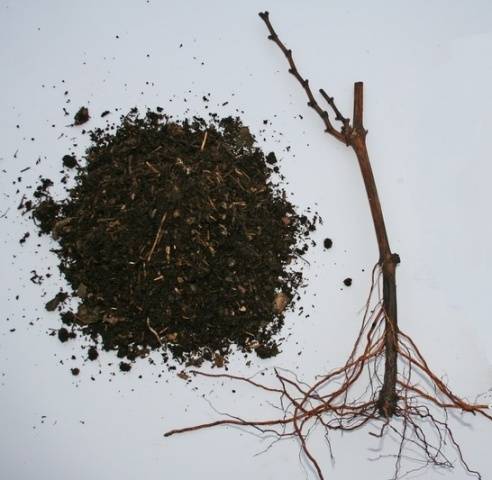Content
The creation of a unique design in a country house is the dream of many gardeners. Isn't it great to relax in the shade of the vines placed on the arch. And picking an amber, ripe bunch of grapes glowing in the sun and treating your friends with the fruits of your labor is already a fairy tale. This is not just a dream fairy tale, but a completely feasible reality. You just need to choose the right variety.
If you are thinking about planting grapes, pay attention to Velika grapes. It should be noted that there are few people who would not like the taste and aroma of berries. And the variety has a good harvest. So it remains to get acquainted with the description, characteristics and features of cultivation.
Bulgarian newcomer
The grape variety Velika comes from Bulgaria. Breeder Ivan Todorov, based on the parental varieties Alphonse Lavalle and Bolgar, in 1987 managed to get a new grape by crossing. It is distinguished by its mid-early ripening period, large grapes and excellent taste. In Bulgaria, you can taste its fruits at the end of August. The State
The Velika variety register was included ten years later.
Features of grapes
The Velika grape is a red table variety highly valued by both amateur and professional winegrowers. Unfortunately, photos do not always allow you to appreciate a variety without a detailed description.
Description of the bush
The Bulgarian grape variety can be recognized by the large size of all parts of the plant. The bushes have a powerful stature, so the formation should be done 3-4 months after planting.
The description of the rapid growth of the Giant grape excites even experienced gardeners. Growth can be controlled with vigorous rootstocks. The best, as the author of the variety himself believed, are Monticola, Chasni, Berlandieri. In this case, not only the yield increases, but also the size of the groves.
The flowers on the Velika variety are bisexual, so the inflorescences are 100 percent pollinated, there are no peas. The beauty of grapes is that only a vine of this variety can be grown on the site.
Leaves
The foliage of the Velika variety has a deep cut (small compared to the size of the bush), round in shape. The leaf plate is smooth on top, and the bottom surface is rough. There are specimens with five or seven lobes.
Description of bunches and grapes
The berries ripen on cone-shaped, elongated clusters of medium density. Weight from 600 to 1000 grams. There are also champions up to 1.5 kg, if the technological standards of cultivation and care are observed. The length of the brush is up to 20 cm, and the width is up to 15 cm.
According to the description of the variety (this can be seen in the photo) and reviews of gardeners, the Velika grape has a record size. Each grape is up to 39 mm long and up to 25 mm wide, weighing about 15 grams. Many people compare berries to the size of a matchbox. Elongated oval fruits are most often pointed towards the tip.
In technical maturity, the berries are dark blue with a clearly visible hue of burgundy. The fruits are dull, as they are covered with natural wax, which protects the grapes from mechanical damage and fungal diseases.Below is a photo of the Velika grape variety, which reflects this description well.
The pulp of Velika grapes is pinkish inside, not too watery, crunchy. Seeds, as such, are absent, sometimes rudiments are found.
The peel of the fruit is dense, but not tough (according to consumer reviews, it does not affect the taste), which ensures high stability:
- berries do not crack;
- do not grow under unfavorable conditions;
- grapes do not lose their presentation, are well transported.
Velika flavor
As for the taste of the Giant grape variety, the photo is not an assistant here. Should be based on feedback from consumers and gardeners. Most of them note that the fruits are richly sweet, taste notes have a lot in common with the parent, the Bolgar variety.
About the Bulgarian grape selection Velika:
Characteristics of the variety
To better understand the merits of Great grapes, only descriptions, gardeners' reviews and photos will not be enough. It is necessary to find out the characteristic features of the variety, its advantages and some disadvantages.
The advantages include:
- High yield of grapes. As a rule, up to 10 kg of fruit can be obtained from one bush on a private plot. When grown on an industrial scale from 350 to 400 c / ha. The uniqueness of the Velika variety is that the harvest is removed not only from fruit buds, but also from replacement buds, although the bunches and grapes are slightly smaller.
- Due to the presence of bisexual flowers, the bunch is full-fledged, without peas, the berries do not crack.
- The berries are sweet, aromatic. In grapes, sugar up to 19 g / 100 cc / cm, acids from 4 to 6 g / l.
- The collected bunches can be stored for a long time in a cool place, which is very important for sellers and buyers.
- Dense berries are perfectly transported, do not lose their presentation.
- Wasps cannot bite through a dense skin, but grapes have to be hidden from birds under a net or in bags.
Despite these advantages, not all gardeners strive to plant Velika grape bushes on their plots, due to the fact that:
- bushes grow too fast;
- grapes have an average winter hardiness, at temperatures below -23 degrees, problems arise, cultivation in the northern regions is undesirable;
- many diseases grapes cannot overcome due to weak immunity, especially it suffers from anthractosis, oidium, alternaria and mildew. There is another problem - the low resistance of the Velika variety to phylloxera (aphids that destroy the root system).
Growing features
Let's talk about the difficulties
From the description and characteristics of the Velika grape variety, it is clear that the plant has its own characteristics that complicate the cultivation of this crop in private plots:
- First, fungal diseases. For planting Velika grapes, you need to choose well-ventilated areas.
- Secondly, you need to water with caution, since excess moisture is dangerous for the root system. In addition, fungal diseases can develop in a humid environment.
- Thirdly, it is unlikely that it will be possible to grow a healthy vine and grape harvest without special treatments. Experienced gardeners use such drugs: Switch, Horus and many other fungicides. Velika grapes quickly become accustomed to processing agents, therefore, to get the effect, they need to be alternated.
- Fourth, mistakes in the care or cultivation of Velika grapes in cold climates leads to a change in the taste and appearance of the berries. The sugar content of the fruit sharply decreases, and the amount of acid increases. Gardeners often write about this in reviews, noting the taste and small berries as negative properties of the variety. It turns out that the problem should be sought not in the characteristics or description of the hybrid, but in the growing conditions.
Reproduction
Saplings of the Velika variety are obtained in various ways:
- Inoculation for other varieties. The most commonly used are CO4 and Chasselas. This will help moderate the rapid growth of the bush a little. Green grape cuttings are inserted into the cleft in the spring. The inoculation should be at a height of 40-150 cm.
- Grafting using lignified cuttings is performed in the aboveground or underground part of the trunk. The cut is made with a sharp (processed) knife, split, and the stalk is inserted. The vaccination site must be pressed, greased with a pitch and pulled with twine.
- Quite good grape seedlings are obtained from rooted cuttings. But this method is possible only if the plants are not affected by phylloxera. Grapes begin to bear fruit in three years.
Care
There is nothing special in caring for Bulgarian grapes, almost everything is traditional.
You can plant seedlings of the Bulgarian variety Velika in spring (March-May) or autumn. Regardless of the time chosen, everything must be done in accordance with agrotechnical standards.
A pit or trench for grapes is dug on the south or southeast side of the garden.
If you have a slope on your site, it's better not to choose a place. The distance to the buildings is at least 5 meters, because the bushes of Velika grapes are vigorous. Seedlings are planted in a voluminous pit with drainage and fertile soil. Watering as needed.
During the season, you need to remove weeds, carry out treatment with fungicides. As a rule, the grapes are sprayed three times (the soil under the bushes is also treated):
- in the spring with Bordeaux liquid or copper oxychloride or Choris;
- The second time during the formation of buds with the help of Strobi. If you are late with spraying and the grapes have bloomed, it is forbidden to spray the plants!
- When the berries become the size of a pea, a third treatment is carried out. You can take Bordeaux liquid, copper oxychloride or other copper-containing fungicidal preparations.
In the event of an outbreak of fungal diseases, the number of treatments for grapes increases. Especially carefully you will have to spray the bushes after removing the bunches in preparation for winter. So that the plants overwinter without diseases and pests.
As for the shelter of the vine for the winter, in the southern regions (according to the description, the plant is thermophilic), it is not required. If you grow it in more severe conditions, you will have to make a lot of effort to create a warm "blanket".
